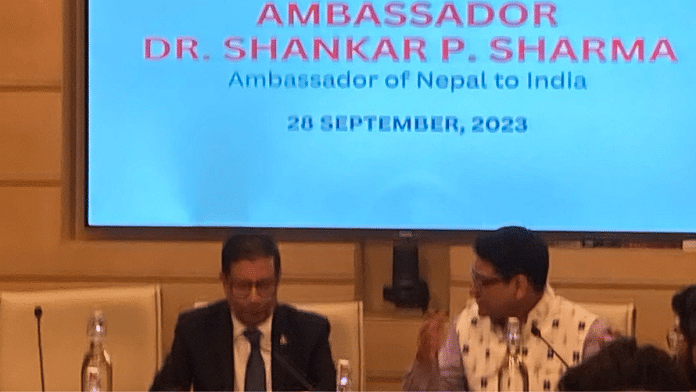New Delhi: Nepal is looking for grants, not loans, from India and China, said Nepal’s Ambassador to India Dr Shankar Prasad Sharma at an event in Delhi Thursday.
“We do not need a loan from countries. What we can take is a grant for the development of Nepal,” Sharma said at the ‘Diplomatic Diaries’ discussion hosted by the Delhi-based think tank Observer Research Foundation (ORF).
The conversation, moderated by Harsh V. Pant, vice-president of studies and foreign policy at ORF, delved into Nepal’s relationship not just with India but also China, with which it signed 12 agreements during Prime Minister Prachanda’s visit to Beijing earlier this week.
Sharma underscored Nepal’s desire to foster positive relationships with all nations, given the developmental needs of the nation. He did, however, acknowledge that Nepal was looking to see what prosperity it could get from the success of China, describing the latter as the world’s second-largest economy with ambitions on the global stage.
Nepal is also a partner in China’s Belt and Road Initiative (BRI), signing a framework agreement in 2017. However, there has been little progress on specific projects.
On this subject, Sharma remained circumspect.
“We must wait and see for the revisions in the implementation of the BRI framework that was signed between Nepal and China in 2017. Maybe, China will suggest certain revisions that are acceptable,” he said.
The BRI, described by China as the “project of the century,” involves over 150 countries, many of which are emerging economies. It aims to create new trade routes connecting China to the world through extensive infrastructure projects, including the construction of ports, roads, railways, and airports and other infrastructure.
As reported earlier by ThePrint, China is grappling with BRI partner countries defaulting on loans and is creating a bailout system to aid these nations.
Also Read: ‘Same as BJP’ in ideology, Nepal Janata Party works to expand — ‘will make Nepal Hindu Rashtra’
Nepal and China
Nepal joined the BRI in May 2017, but no project under it has taken off in the last six years, according to a report earlier this month in the Kathmandu Post, an English-language daily in Nepal.
Earlier this year, China unilaterally declared the construction of Nepal’s Pokhara International Airport, for which the process started in 2013, as a BRI project. Nepal has denied this claim.
Sharma clarified that all developmental projects between China and Nepal have been through bilateral agreements and not via the BRI.
The Nepal PM visited China from September 23 to 30 and reportedly signed 12 agreements, including seven MoUs in areas such as trade, road connectivity and information technology. None of these agreements were under the BRI, according to media reports.
To a question from the audience on reports that the People’s Liberation Army of China was looking to hire Gorkhas from Nepal, Sharma said: “Legally without the permission of the government, Nepalis cannot join other armies, except the United Kingdom, India and Singapore.”
The famed Gorkha regiments of the British Indian Army through a tripartite agreement signed between the UK, India and Nepal in 1947 was split after Indian independence. India still maintains Gorkha regiments, but has made no recruitments to the regiment since the pandemic, as reported by ThePrint.
‘Deep, strong, broad’ ties with India
Sharma said that Nepal and India shared a “deep, strong, and broad” relationship, noting that the health of Nepal’s economy was tied to India’s.
However, he claimed that despite the historical and cultural connection between the two countries, challenges have emerged, including a decline in people-to-people ties, especially among students.
“The older universities like Banaras (Hindu University) and Presidency College Madras all had Nepali students in the past, but these universities today have not given enough attention to them,” Sharma said,
On a question from ThePrint regarding Nepal’s position on the India-Canada diplomatic tussle, Sharma claimed that he had no information to share as Kathmandu had not made its views public.
So far, two neighbours of India, Bangladesh and Sri Lanka, have spoken out in India’s defence on Canadian accusations of carrying out the killing of pro-Khalistan leader Hardeep Singh Nijjar in June this year.
During the discussion, Sharma also highlighted the tripartite agreement between India, Nepal, and Bangladesh for the export of power from Nepal to Bangladesh through India was in its final stages and a meeting could be held anytime to finalise it.
“India and Bangladesh currently do not have the transmission capacity required,” Sharma explained.
This project is a part of Nepal’s goal to become a net exporter of energy within the next two years. Sharma added that New Delhi and Kathmandu have signed an agreement for the export of 10,000 megawatts of power from Nepal to New Delhi over the next 10 years.
(Edited by Richa Mishra)
Also Read: China places Kathmandu centre stage at expo to mark 10 yrs of BRI. But projects in Nepal in limbo



